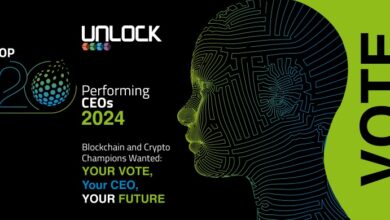RTA’s Vision Meets SmartCrowd’s Readiness: Advancing Tokenization of Real-World Assets
Siddiq Farid, Co-founder and CEO of SmartCrowd, shares key insights about the partnership in UNLOCK Blockchain interview

Blockchain technology holds significant potential for disrupting established markets and expanding distribution opportunities, particularly for retail investors. However, regulatory considerations often arise when projects target retail investors, emphasizing token security and investor protection. Institutional support currently appears more robust. Yet, a common question persists: why pursue tokenization?
The immediate benefits may not be readily apparent, but they become evident as participation grows. These advantages encompass broader distribution and enhanced liquidity in secondary markets. Nonetheless, attaining these benefits may require time and patience.
On that note, the Dubai Roads and Transport Authority (RTA) has entered into a strategic partnership with SmartCrowd Holding Ltd, the parent company of SmartCrowd Ltd, to create a joint digital platform leveraging blockchain technology.
SmartCrowd Ltd is licensed by the Dubai Financial Services Authority and is recognized as the first digital platform specializing in investment and crowdfunding in the Middle East and North Africa.
This initiative aims to attract investments in non-fungible digital assets (NFTs) related to public facilities and real estate in Dubai. In fact, it will facilitate the development and implementation of future projects in Dubai, such as rest houses featuring retail stores and various service centers, offering continuous investment returns.
In an interview with UNLOCK Blockchain, Siddiq Farid, Co-founder and CEO of SmartCrowd, highlighted some important details.
He explained that In a progressive move towards economic inclusion and innovation, Dubai is considering a series of commercial projects underpinned by tokenization. The initiative, spearheaded by the RTA, aims to introduce a novel approach to property investment, allowing greater public participation through digital tokens.
During the discussion, the project’s concept was elaborated, emphasizing the potential for creating coffee shops and similar ventures. The main thrust is to collaborate with the RTA’s commercial team to identify viable projects that are not only profitable but also attractive to investors. The goal is to leverage tokenization to democratize investment, allowing more people to gain economic returns.
“We haven’t finalized a specific project yet, but the idea is to work with the commercial team within the RTA to identify projects that make commercial sense,” said Siddiq. “It’s about raising capital and providing economic returns to participants through these projects.”
The proposed framework involves multiple stakeholders, including the Land Department, the Department of Economy, and various financial regulators such as the Central Bank, VARA, SCA, FSRA & DFSA. This multi-faceted approach is crucial for ensuring the legal and regulatory aspects of tokenized ownership are thoroughly addressed.
Economic Inclusion through Tokenization
Tokenization of assets is envisioned to allow individuals to own fractions of a property, such as a coffee shop, through digital tokens. These tokens could potentially provide legal ownership or a share in the economic benefits of the asset. The specifics, however, remain under discussion due to regulatory and legal complexities.
“There’s no definitive structure yet because regulations are still evolving. We have a proposed framework but need to work with various stakeholders to get it right,” Siddiq added.
This approach aligns with the principles of Public-Private Partnerships (PPPs), providing a more innovative and transparent model. The objective is to enhance sustainability and inclusion by giving a broader audience access to investments they otherwise couldn’t afford.
Challenges and Future Prospects
Despite the promising prospects, hurdles remain evident. According to Siddiq, the lack of clear regulations on tokenized assets internationally still poses a challenge. However, ongoing efforts are really helping in creating a conducive environment for such innovations.
“We are encouraged by the conversations and various initiatives happening in parallel,” Siddiq noted. “For example, the Crown Prince’s new Sandbox strategy for real estate technology, launched in partnership with the Dubai Future Foundation and the Land Department, is a very positive step.”
Vision for the Future
Looking ahead, Siddiq sees the integration of digital assets into the property market as inevitable. While full realization of this vision might take a few more years, the initial steps are being taken with enthusiasm.
“Our thesis has always been clear: the world is heading towards digitization of assets. Tokenization doesn’t just create liquidity; it increases the utility of assets, allowing for multiple income streams and broader economic participation,” the spokesperson emphasized.
To conclude, Dubai’s initiative to explore tokenized real estate ventures represents a major step towards economic democratization. By involving multiple stakeholders and focusing on innovative frameworks, the city aims to set a precedent in the region for how public participation in commercial projects can be enhanced through technology.
In order to embrace tokenization, efforts must be focused on regulatory engagement, market education, and technological innovation. Continued dialogue, research, and pilot projects will play a vital role in navigating the changing landscape and capitalizing on emerging opportunities.
By fostering an environment conducive to innovation and collaboration, stakeholders can pave the way for a more inclusive, resilient, and efficient financial future.





